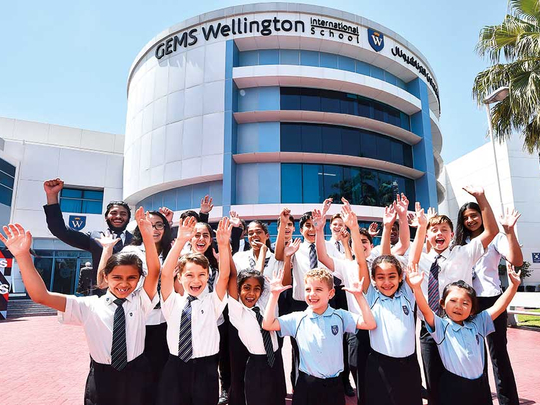
Dubai: Almost two-third of Dubai students are now in ‘good’ or higher-rated schools, the highest ratio since inspections began in the 2008-2009 cycle.
The latest Dubai School Inspection Bureau (DSIB) report, released on Tuesday, noted 64 per cent of students attend such schools, compared to just 30 per cent in the 2008-2009 cycle.
The development also marks a three per cent increase in the ratio since last school year’s inspection results.
Click here for full list of KHDA ratings
The DSIB is part of the Knowledge and Human Development Authority (KHDA) of Dubai. The full inspection report is available on www.khda.gov.ae
Of the 159 schools inspected this academic year, 16 schools were rated ‘outstanding’, 14 ‘very good’, 69 ‘good’, 50 ‘acceptable’ and 10 ‘weak’. None of them was rated ‘very weak’.
Overall, 10 schools improved their rating while four slid down.
Also for the first time, more than half (54 per cent) of Emirati students in Dubai private schools attend good or better schools — double the ratio in the 2008-2009 cycle.
‘Collaborative culture’
Dr Abdullah Al Karam, director-general of KHDA, said the improvements are mainly down to “a culture of collaboration”. In 2016, the KHDA launched the Abundance Group in which ‘outstanding’ and ‘very good’ schools participating in the initiative are given the option of self-evaluation in place of DSIB inspections. The option is “allowing them to focus their resources on giving back to other schools”, the KHDA said in 2016.
On Tuesday, Dr Al Karam said: “Every year, we continue to see further improvement in Dubai’s education landscape. More schools than ever are now offering a better quality of education. This improvement has been made possible by creating a culture of collaboration, which has encouraged schools to learn from each other and continue to grow.”
Simon O’Connor, principal of Jumeirah College, rated ‘outstanding’ eight times, told Gulf News: “Over the last year, we have had the opportunity to work with the KHDA Abundance Group. Working with Jumeirah Primary School, we have been supporting Emirates English Speaking School in such areas as assessment and leadership development. As is always the case when linking with colleagues from different contexts, this has been both fascinating and rewarding. We have learnt a huge amount, as well as helping another school to develop its practice. I am very hopeful that this arrangement will continue to develop in the future.”
National agenda
Tuesday’s report also noted that two-third of Dubai private schools that took part in testing for the National Agenda targets have met or exceeded expectations.
The National Agenda was launched in 2014 by His Highness Shaikh Mohammad Bin Rashid Al Maktoum, Vice-President and Prime Minister of the UAE and Ruler of Dubai, to help achieve UAE Vision 2021.
The school inspection reports carry a special National Agenda section for schools that are required to participate in international standardised tests. The TIMSS (Trends in International Mathematics and Science Study) evaluates the maths and science skills of students in grades four and eight, while PISA (Programme for International Student Assessment) measures the reading, mathematics and science skills of 15-year-olds.
The UAE Vision 2021 mandates that the UAE’s ranking and average score for TIMSS and PISA be among the world’s top performing countries.
In January, the KHDA had announced that the performance of Dubai private schools for grade eight in TIMSS 2015 — the latest cycle — was on a par with schools in the top 15 high-performing countries.
Also, in PISA 2015, Dubai private schools performed similar to schools in the top 20 countries in reading and science.
On Tuesday, Dr Al Karam said the National Agenda “brings all parties together” in education, adding “we have common goals” under the Vision 2021.
Also new this year, parents in Dubai on Tuesday received an individually-addressed letter from the KHDA about the progress made by their child’s school and highlights of the inspection reports.
Islamic and Arabic education
There has been a 62 per cent ‘good or better’ progress in Islamic education in Dubai schools
There has been a 49 per cent ‘good or better’ progress in Arabic studies in Dubai schools
Students are offered optional after-school sessions to improve in these subjects
Some schools also offer Arabic classes for parents
Inspectors evaluate progress in Islamic education in areas such as Islamic values, law and life story of Prophet Mohammad (PBUH)
Fee hikes
Outstanding schools are eligible for a fee hike of up to 4.8 per cent (double the Education Cost Index, which is 2.4 per cent)
Very good schools eligible up to 4.2 per cent
Good schools eligible up to 3.6 per cent
All others eligible up to 2.4 per cent












